目錄
1 ObjectQuery<T>數據加載方式 1
1.1 訪問方式 1
1.2 Context.CreateQuery<T>() 1
1.3 ObjectQuery<DbDataRecord> 2
1.4 ObjectQuery<簡單類型> 3
2 Execute方法與ObjectResult 3
2.1 Execute方法 3
2.2 ObjectResult<T> 結果集 4
3 類型轉換 4
3.1 OfType(TResultType) 4
4 Linq方法 5
4.1 All 5
4.2 Any 5
4.3 Take 5
4.4 Skip 5
4.5 First 6
4.6 FirstOrDefault 6
4.7 Where 6
4.8 Distinct 6
4.9 OrderBy,OrderByDescending 7
4.10 ThenBy,ThenByDescending 7
4.11 Average,Sum 7
4.12 Max,Min 7
4.13 Count,LongCount 8
4.14 Concat 8
4.15 Union 8
4.16 UnionAll 9
4.17 Except 10
4.18 Intersect 11
4.19 Select 11
4.20 GroupBy 11
4.21 Join 13
4.22 GroupJoin 14
5 無效的Linq方法 15
5.1 Aggregate 15
5.2 TakeWhile 15
5.3 SkipWhile 15
5.4 Reverse 16
5.5 Last,LastOrDefault 16
5.6 Single,SingleOrDefault 16
5.7 Contains 17
5.8 Distinct 17
5.9 ElementAt,ElementAtOrDefault 17
5.10 DefaultIfEmpty 17
5.11 SelectMany 18
5.12 SequenceEqual 19
ObjectQuery<T>數據加載方式
1. ObjectQuery<T> 提供了一個管理[實體對像]集合
2. ObjectQuery<T>繼承System.Data.Objects.ObjectQuery, ObjectQuery對ObjectContext進行了封裝,
3.可以通過ObjectContext.CreateQuery<T>("esql")的方式創建ObjectQuery<T>
4.可以通過new ObjectQuery<T>(ObjectContext,"esql")的方式創建ObjectQuery<T>,跟據SQL字串的不同,會得到具體的ObjectQuery<值類型>,或ObjectQuery<DbDataRecord>或ObjectQuery<實體>
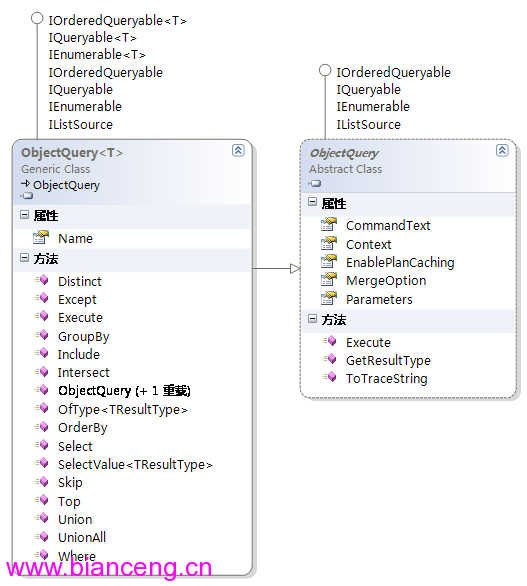
訪問方式
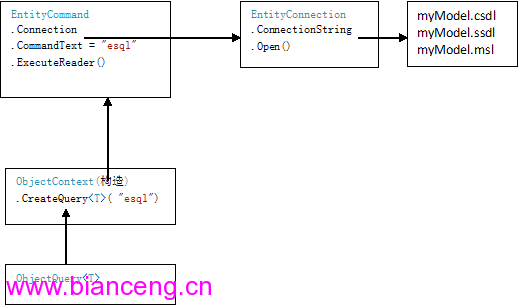
Context.CreateQuery<T>()
string econString = @"
metadata=res://*/myModel.csdl
|res://*/myModel.ssdl
|res://*/myModel.msl
;
provider=System.Data.SqlClient;
provider connection string=""
Data Source=.;
Initial Catalog=LingTestDB;
Integrated Security=True;
MultipleActiveResultSets=True;
""
";
EntityConnection econ = new EntityConnection(econString);
ObjectContext context = new ObjectContext(econ);
context.DefaultContainerName = "myContext";
ObjectQuery<DBItem> queryTab = context.CreateQuery<DBItem>("DBItem");
foreach (var r in queryTab)
{
System.Console.WriteLine("{0},{1}", r.ItemID, r.ItemMatter);
}
string econString = @"
metadata=res://*/myModel.csdl
|res://*/myModel.ssdl
|res://*/myModel.msl
;
provider=System.Data.SqlClient;
provider connection string=""
Data Source=.;
Initial Catalog=LingTestDB;
Integrated Security=True;
MultipleActiveResultSets=True;
""
";
EntityConnection econ = new EntityConnection(econString);
ObjectContext context = new ObjectContext(econ);
ObjectQuery<DBItem> queryTab = context.CreateQuery<DBItem>("select value it from myContext.DBItem as it where it.ItemID='a'");
foreach (var r in queryTab)
{
System.Console.WriteLine("{0},{1}",r.ItemID,r.ItemMatter);
}
ObjectQuery<DbDataRecord>
string econString = @"
metadata=res://*/myModel.csdl
|res://*/myModel.ssdl
|res://*/myModel.msl
;
provider=System.Data.SqlClient;
provider connection string=""
Data Source=.;
Initial Catalog=LingTestDB;
Integrated Security=True;
MultipleActiveResultSets=True;
""
";
EntityConnection econ = new EntityConnection(econString);
ObjectContext context = new ObjectContext(econ);
ObjectQuery<DbDataRecord> queryTab = new ObjectQuery<DbDataRecord>("select it.ItemID,it.ItemMatter from myContext.DBItem as it", context);
foreach (var r in queryTab)
{
System.Console.WriteLine("{0},{1}",r[0].ToString(),r[1].ToString());
}
ObjectQuery<簡單類型>
string econString = @"
metadata=res://*/myModel.csdl
|res://*/myModel.ssdl
|res://*/myModel.msl
;
provider=System.Data.SqlClient;
provider connection string=""
Data Source=.;
Initial Catalog=LingTestDB;
Integrated Security=True;
MultipleActiveResultSets=True;
""
";
EntityConnection econ = new EntityConnection(econString);
ObjectContext context = new ObjectContext(econ);
ObjectQuery<int> queryTab = new ObjectQuery<int>("select value Count(it.ItemID) from myContext.DBItem as it", context);
foreach (var r in queryTab)
{
System.Console.WriteLine("個數:{0}", r.ToString() );
}
Execute方法與ObjectResult Execute方法
string econString = @"
metadata=res://*/myModel.csdl
|res://*/myModel.ssdl
|res://*/myModel.msl
;
provider=System.Data.SqlClient;
provider connection string=""
Data Source=.;
Initial Catalog=LingTestDB;
Integrated Security=True;
MultipleActiveResultSets=True;
""
";
EntityConnection econ = new EntityConnection(econString);
ObjectContext context = new ObjectContext(econ);
context.DefaultContainerName = "myContext";
ObjectQuery<DBItem> queryTab = context.CreateQuery<DBItem>("DBItem");
ObjectResult<DBItem> resultTab = queryTab.Execute(MergeOption.NoTracking);
foreach (var r in resultTab)
{
System.Console.WriteLine("{0},{1}",r.ItemID,r.ItemMatter);
}
ObjectResult<T> 結果集
ObjectQuery<T>.Execute()方法返回ObjectResult<T>對象
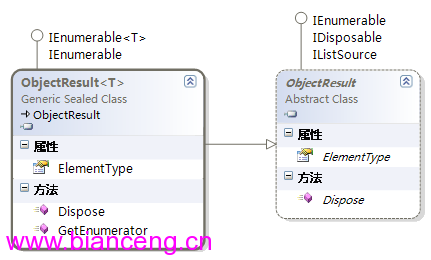
類型轉換 OfType(TResultType)
ObjectQuery<TResultType> OfType<TResultType>();
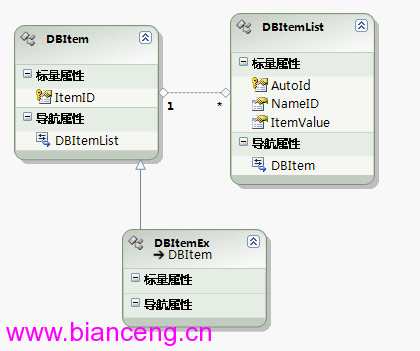
myContext context = new myContext();
ObjectQuery<DBItemEx> v = context.DBItem.OfType<DBItemEx>();
Linq方法 All
判斷集合中是否所有元素都滿足某一條件
myContext context = new myContext();
bool b= context.DBItemList.All(p => p.ItemValue >= 0);
SELECT
CASE WHEN ( NOT EXISTS (SELECT
cast(1 as bit) AS [C1]
FROM [dbo].[DBItemList] AS [Extent1]
WHERE ( NOT ([Extent1].[ItemValue] >= 1)) OR (CASE WHEN ([Extent1].[ItemValue] >= 0) THEN cast(1 as bit) WHEN ( NOT ([Extent1].[ItemValue] >= 0)) THEN cast(0 as bit) END IS NULL)
)) THEN cast(1 as bit) WHEN ( EXISTS (SELECT
cast(1 as bit) AS [C1]
FROM [dbo].[DBItemList] AS [Extent2]
WHERE ( NOT ([Extent2].[ItemValue] >= 0)) OR (CASE WHEN ([Extent2].[ItemValue] >= 0) THEN cast(1 as bit) WHEN ( NOT ([Extent2].[ItemValue] >= 0)) THEN cast(0 as bit) END IS NULL)
)) THEN cast(0 as bit) END AS [C1]
FROM ( SELECT cast(1 as bit) AS X ) AS [SingleRowTable1]
Any
判斷集合中是否有元素滿足某一條件
myContext context = new myContext();
bool b = context.DBItemList.Any(p => p.ItemValue == 4);
SELECT
CASE WHEN ( EXISTS (SELECT
cast(1 as bit) AS [C1]
FROM [dbo].[DBItemList] AS [Extent1]
WHERE 4 = [Extent1].[ItemValue]
)) THEN cast(1 as bit) WHEN ( NOT EXISTS (SELECT
cast(1 as bit) AS [C1]
FROM [dbo].[DBItemList] AS [Extent2]
WHERE 4 = [Extent2].[ItemValue]
)) THEN cast(0 as bit) END AS [C1]
FROM ( SELECT cast(1 as bit) AS X ) AS [SingleRowTable1]
Take
獲取集合的前n個元素
myContext context = new myContext();
IQueryable<DBItemList> list = context.DBItemList.Take(3);
SELECT TOP (3)
[c].[AutoId] AS [AutoId],
[c].[NameID] AS [NameID],
[c].[ItemID] AS [ItemID],
[c].[ItemValue] AS [ItemValue]
FROM [dbo].[DBItemList] AS [c]
Skip
跳過集合的前n個元素,
Linq To Entity 要求必須先OrderBy
myContext context = new myContext();
IQueryable<DBItemList> list = context.DBItemList.OrderBy(p=>p.ItemValue).Skip(5);
SELECT
[Extent1].[AutoId] AS [AutoId],
[Extent1].[NameID] AS [NameID],
[Extent1].[ItemID] AS [ItemID],
[Extent1].[ItemValue] AS [ItemValue]
FROM ( SELECT [Extent1].[AutoId] AS [AutoId], [Extent1].[NameID] AS [NameID], [Extent1].[ItemID] AS [ItemID], [Extent1].[ItemValue] AS [ItemValue], row_number() OVER (ORDER BY [Extent1].[ItemValue] ASC) AS [row_number]
FROM [dbo].[DBItemList] AS [Extent1]
) AS [Extent1]
WHERE [Extent1].[row_number] > 5
ORDER BY [Extent1].[ItemValue] ASC
First
集合的第一個元素,集合中沒有會報錯,
myContext context = new myContext();
DBItemList f1 = context.DBItemList.First();
DBItemList fi = context.DBItemList.First(p => p.ItemValue == 5);
SELECT TOP (1)
[Extent1].[AutoId] AS [AutoId],
[Extent1].[NameID] AS [NameID],
[Extent1].[ItemID] AS [ItemID],
[Extent1].[ItemValue] AS [ItemValue]
FROM [dbo].[DBItemList] AS [Extent1]
WHERE 5 = [Extent1].[ItemValue]
FirstOrDefault
集合中的第一個元素,沒有則返回類型默認值,對象型默認值為null
myContext context = new myContext();
DBItemList fi = context.DBItemList.FirstOrDefault(p => p.ItemValue ==5);
if (fi != null)
{
Console.WriteLine(fi.ItemValue);
}
Where
用LinqExpressions為條件進行查詢
myContext context = new myContext();
IQueryable<DBItemList> list= context.DBItemList.Where(p => p.ItemValue == 5);
SELECT
[Extent1].[AutoId] AS [AutoId],
[Extent1].[NameID] AS [NameID],
[Extent1].[ItemID] AS [ItemID],
[Extent1].[ItemValue] AS [ItemValue]
FROM [dbo].[DBItemList] AS [Extent1]
WHERE 5 = [Extent1].[ItemValue]
Distinct
過濾集合中的相同項
ObjectQuery<T> Distinct()
myContext context = new myContext();
ObjectQuery<DbDataRecord> list = context.DBItemList.Select("it.ItemValue");
ObjectQuery<DbDataRecord> dlist= list.Distinct();
SELECT
[Distinct1].[C1] AS [C1],
[Distinct1].[ItemValue] AS [ItemValue]
FROM ( SELECT DISTINCT
[Extent1].[ItemValue] AS [ItemValue],
1 AS [C1]
FROM [dbo].[DBItemList] AS [Extent1]
) AS [Distinct1]
OrderBy,OrderByDescending
排序升,排序降
myContext context = new myContext();
IQueryable<DBItemList> list = context.DBItemList.OrderBy(p=>p.ItemValue);
IQueryable<DBItemList> list = context.DBItemList.OrderByDescending(p=>p.ItemValue);
SELECT
[Extent1].[AutoId] AS [AutoId],
[Extent1].[NameID] AS [NameID],
[Extent1].[ItemID] AS [ItemID],
[Extent1].[ItemValue] AS [ItemValue]
FROM [dbo].[DBItemList] AS [Extent1]
ORDER BY [Extent1].[ItemValue] ASC
SELECT
[Extent1].[AutoId] AS [AutoId],
[Extent1].[NameID] AS [NameID],
[Extent1].[ItemID] AS [ItemID],
[Extent1].[ItemValue] AS [ItemValue]
FROM [dbo].[DBItemList] AS [Extent1]
ORDER BY [Extent1].[ItemValue] DESC
ThenBy,ThenByDescending
ThenBy,ThenByDescending 方法必須跟在 OrderBy 方法或對 ThenBy 方法的另一次調用之後
當用OrderBy,OrderByDescending指定主排序字段後,可用ThenBy呀ThenByDescending指定次排序字段
myContext context = new myContext();
IQueryable<DBItemList> query = context.DBItemList.OrderBy(p=>p.ItemValue).ThenByDescending(p => p.ItemID);
foreach (var r in query)
{
Console.WriteLine("{0},{1},{2},{3}", r.AutoId, r.ItemID, r.NameID, r.ItemValue);
}
SELECT
[Extent1].[AutoId] AS [AutoId],
[Extent1].[NameID] AS [NameID],
[Extent1].[ItemID] AS [ItemID],
[Extent1].[ItemValue] AS [ItemValue]
FROM [dbo].[DBItemList] AS [Extent1]
ORDER BY [Extent1].[ItemValue] ASC, [Extent1].[ItemID] DESC
Average,Sum
平均值,求和
myContext context = new myContext();
double d = context.DBItemList.Average(p => p.ItemValue);
double s = context.DBItemList.Sum(p => p.ItemValue);
SELECT
[GroupBy1].[A1] AS [C1]
FROM ( SELECT cast(1 as bit) AS X ) AS [SingleRowTable1]
LEFT OUTER JOIN (SELECT
AVG( CAST( [Extent1].[ItemValue] AS float)) AS [A1]
FROM [dbo].[DBItemList] AS [Extent1] ) AS [GroupBy1] ON 1 = 1
SELECT
[GroupBy1].[A1] AS [C1]
FROM ( SELECT cast(1 as bit) AS X ) AS [SingleRowTable1]
LEFT OUTER JOIN (SELECT
SUM([Extent1].[ItemValue]) AS [A1]
FROM [dbo].[DBItemList] AS [Extent1] ) AS [GroupBy1] ON 1 = 1
Max,Min
集合最大值,最小值
myContext context = new myContext();
var mx = context.DBItemList.Max(p => p.ItemValue);
var mi = context.DBItemList.Min(p => p.ItemValue);
SELECT
[GroupBy1].[A1] AS [C1]
FROM ( SELECT cast(1 as bit) AS X ) AS [SingleRowTable1]
LEFT OUTER JOIN (SELECT
MAX([Extent1].[ItemValue]) AS [A1]
FROM [dbo].[DBItemList] AS [Extent1] ) AS [GroupBy1] ON 1 = 1
SELECT
[GroupBy1].[A1] AS [C1]
FROM ( SELECT cast(1 as bit) AS X ) AS [SingleRowTable1]
LEFT OUTER JOIN (SELECT
MIN([Extent1].[ItemValue]) AS [A1]
FROM [dbo].[DBItemList] AS [Extent1] ) AS [GroupBy1] ON 1 = 1
Count,LongCount
集合中的元素個數
myContext context = new myContext();
int n = context.DBItemList.Count();
int ni = context.DBItemList.Count(p => p.ItemValue == 5);
long ln = context.DBItemList.LongCount();
SELECT
[GroupBy1].[A1] AS [C1]
FROM ( SELECT cast(1 as bit) AS X ) AS [SingleRowTable1]
LEFT OUTER JOIN (SELECT
COUNT(cast(1 as bit)) AS [A1]
FROM [dbo].[DBItemList] AS [Extent1]
WHERE 5 = [Extent1].[ItemValue] ) AS [GroupBy1] ON 1 = 1
Concat
連接不同集合,不會自動過濾相同項,兩個集合可以不是同一個Context
myContext context1 = new myContext();
myContext context2 = new myContext();
IQueryable<DBItemList> list1 = context1.DBItemList.Where(p => p.ItemValue == 1);
IQueryable<DBItemList> list2 = context1.DBItemList.Where(p => p.ItemValue == 2);
IQueryable<DBItemList> list = list1.Concat(list2);
SELECT
[UnionAll1].[AutoId] AS [C1],
[UnionAll1].[NameID] AS [C2],
[UnionAll1].[ItemID] AS [C3],
[UnionAll1].[ItemValue] AS [C4]
FROM (SELECT
[Extent1].[AutoId] AS [AutoId],
[Extent1].[NameID] AS [NameID],
[Extent1].[ItemID] AS [ItemID],
[Extent1].[ItemValue] AS [ItemValue]
FROM [dbo].[DBItemList] AS [Extent1]
WHERE 1 = [Extent1].[ItemValue]
UNION ALL
SELECT
[Extent2].[AutoId] AS [AutoId],
[Extent2].[NameID] AS [NameID],
[Extent2].[ItemID] AS [ItemID],
[Extent2].[ItemValue] AS [ItemValue]
FROM [dbo].[DBItemList] AS [Extent2]
WHERE 2 = [Extent2].[ItemValue]) AS [UnionAll1]
Union
連接不同集合,自動過濾相同項,兩個集合要是同一個Context
ObjectQuery<T> Union(ObjectQuery<T> query)
IQueryable<T> Union( IQueryable<T> query)
IQueryable<T> Uniont( IQueryable<T> query,IEqualityComparer<T>)
myContext context1 = new myContext();
IQueryable<DBItemList> query1 = context1.DBItemList.Where(p => p.ItemID == "c" || p.ItemID == "b");
IQueryable<DBItemList> query2 = context1.DBItemList.Where(p => p.ItemID == "c" || p.ItemID == "a");
IQueryable<DBItemList> v = query2.Union(query1);
foreach (var r in v)
{
Console.WriteLine("{0},{1},{2},{3}", r.AutoId, r.ItemID, r.NameID, r.ItemValue);
}
myContext context1 = new myContext();
ObjectQuery<DBItemList> query1 = context1.CreateQuery<DBItemList>("select value it from myContext.DBItemList as it where it.ItemID == 'c' || it.ItemID == 'b' ");
ObjectQuery<DBItemList> query2 = context1.CreateQuery<DBItemList>("select value it from myContext.DBItemList as it where it.ItemID == 'c' || it.ItemID == 'a' ");
ObjectQuery<DBItemList> v = query2.Union(query1);
foreach (var r in v)
{
Console.WriteLine("{0},{1},{2},{3}", r.AutoId, r.ItemID, r.NameID, r.ItemValue);
}
SELECT
[Distinct1].[C1] AS [C1],
[Distinct1].[C2] AS [C2],
[Distinct1].[C3] AS [C3],
[Distinct1].[C4] AS [C4]
FROM ( SELECT DISTINCT
[UnionAll1].[AutoId] AS [C1],
[UnionAll1].[NameID] AS [C2],
[UnionAll1].[ItemID] AS [C3],
[UnionAll1].[ItemValue] AS [C4]
FROM (SELECT
[Extent1].[AutoId] AS [AutoId],
[Extent1].[NameID] AS [NameID],
[Extent1].[ItemID] AS [ItemID],
[Extent1].[ItemValue] AS [ItemValue]
FROM [dbo].[DBItemList] AS [Extent1]
WHERE (N'c' = [Extent1].[ItemID]) OR (N'a' = [Extent1].[ItemID])
UNION ALL
SELECT
[Extent2].[AutoId] AS [AutoId],
[Extent2].[NameID] AS [NameID],
[Extent2].[ItemID] AS [ItemID],
[Extent2].[ItemValue] AS [ItemValue]
FROM [dbo].[DBItemList] AS [Extent2]
WHERE (N'c' = [Extent2].[ItemID]) OR (N'b' = [Extent2].[ItemID])) AS [UnionAll1]
) AS [Distinct1]
UnionAll
兩個集合的相同項都會返回,兩個集合要是同一個Context
ObjectQuery<T> UnionAll(ObjectQuery<T> query);
myContext context1 = new myContext();
ObjectQuery<DBItemList> query1 = context1.CreateQuery<DBItemList>("select value it from myContext.DBItemList as it where it.ItemID == 'c' || it.ItemID == 'b' ");
ObjectQuery<DBItemList> query2 = context1.CreateQuery<DBItemList>("select value it from myContext.DBItemList as it where it.ItemID == 'c' || it.ItemID == 'a' ");
ObjectQuery<DBItemList> v = query2.UnionAll(query1);
foreach (var r in v)
{
Console.WriteLine("{0},{1},{2},{3}", r.AutoId, r.ItemID, r.NameID, r.ItemValue);
}
SELECT
[UnionAll1].[AutoId] AS [C1],
[UnionAll1].[NameID] AS [C2],
[UnionAll1].[ItemID] AS [C3],
[UnionAll1].[ItemValue] AS [C4]
FROM (SELECT
[Extent1].[AutoId] AS [AutoId],
[Extent1].[NameID] AS [NameID],
[Extent1].[ItemID] AS [ItemID],
[Extent1].[ItemValue] AS [ItemValue]
FROM [dbo].[DBItemList] AS [Extent1]
WHERE ([Extent1].[ItemID] = 'c') OR ([Extent1].[ItemID] = 'a')
UNION ALL
SELECT
[Extent2].[AutoId] AS [AutoId],
[Extent2].[NameID] AS [NameID],
[Extent2].[ItemID] AS [ItemID],
[Extent2].[ItemValue] AS [ItemValue]
FROM [dbo].[DBItemList] AS [Extent2]
WHERE ([Extent2].[ItemID] = 'c') OR ([Extent2].[ItemID] = 'b')) AS [UnionAll1]
Except
從某集合中刪除其與另一個集合中相同的項,兩個集合要是同一個Context
ObjectQuery<T> Except(ObjectQuery<T> query)
IQueryable<T> Except( IQueryable<T> query)
IQueryable<T> Except( IQueryable<T> query,IEqualityComparer<T>)
myContext context1 = new myContext();
IQueryable<DBItemList> query1 = context1.DBItemList.Where(p => p.ItemID == "c" || p.ItemID == "b");
IQueryable<DBItemList> query2 = context1.DBItemList.Where(p => p.ItemID == "c" || p.ItemID == "a");
IQueryable<DBItemList> v = query2.Except(query1);
foreach (var r in v)
{
Console.WriteLine("{0},{1},{2},{3}", r.AutoId, r.ItemID, r.NameID, r.ItemValue);
}
myContext context1 = new myContext();
ObjectQuery<DBItemList> query1 = context1.CreateQuery<DBItemList>("select value it from myContext.DBItemList as it where it.ItemID == 'c' || it.ItemID == 'b' ");
ObjectQuery<DBItemList> query2 = context1.CreateQuery<DBItemList>("select value it from myContext.DBItemList as it where it.ItemID == 'c' || it.ItemID == 'a' ");
ObjectQuery<DBItemList> v = query2.Except(query1);
foreach (var r in v)
{
Console.WriteLine("{0},{1},{2},{3}", r.AutoId, r.ItemID, r.NameID, r.ItemValue);
}
SELECT
[Except1].[AutoId] AS [C1],
[Except1].[NameID] AS [C2],
[Except1].[ItemID] AS [C3],
[Except1].[ItemValue] AS [C4]
FROM (SELECT
[Extent1].[AutoId] AS [AutoId],
[Extent1].[NameID] AS [NameID],
[Extent1].[ItemID] AS [ItemID],
[Extent1].[ItemValue] AS [ItemValue]
FROM [dbo].[DBItemList] AS [Extent1]
WHERE (N'c' = [Extent1].[ItemID]) OR (N'a' = [Extent1].[ItemID])
EXCEPT
SELECT
[Extent2].[AutoId] AS [AutoId],
[Extent2].[NameID] AS [NameID],
[Extent2].[ItemID] AS [ItemID],
[Extent2].[ItemValue] AS [ItemValue]
FROM [dbo].[DBItemList] AS [Extent2]
WHERE (N'c' = [Extent2].[ItemID]) OR (N'b' = [Extent2].[ItemID])) AS [Except1]
Intersect
獲取不同集合的相同項(交集),兩個集合要是同一個Context
ObjectQuery<T> Intersect(ObjectQuery<T> query)
IQueryable<T> Intersect( IQueryable<T> query)
IQueryable<T> Intersect( IQueryable<T> query,IEqualityComparer<T>)
myContext context1 = new myContext();
IQueryable<DBItemList> query1 = context1.DBItemList.Where(p => p.ItemID == "c" || p.ItemID == "b");
IQueryable<DBItemList> query2 = context1.DBItemList.Where(p => p.ItemID == "c" || p.ItemID == "a");
IQueryable<DBItemList> v = query2.Intersect(query1);
foreach (var r in v)
{
Console.WriteLine("{0},{1},{2},{3}", r.AutoId, r.ItemID, r.NameID, r.ItemValue);
}
myContext context1 = new myContext();
ObjectQuery<DBItemList> query1 = context1.CreateQuery<DBItemList>("select value it from myContext.DBItemList as it where it.ItemID == 'c' || it.ItemID == 'b' ");
ObjectQuery<DBItemList> query2 = context1.CreateQuery<DBItemList>("select value it from myContext.DBItemList as it where it.ItemID == 'c' || it.ItemID == 'a' ");
ObjectQuery<DBItemList> v = query2.Intersect(query1);
foreach (var r in v)
{
Console.WriteLine("{0},{1},{2},{3}", r.AutoId, r.ItemID, r.NameID, r.ItemValue);
}
SELECT
[Intersect1].[AutoId] AS [C1],
[Intersect1].[NameID] AS [C2],
[Intersect1].[ItemID] AS [C3],
[Intersect1].[ItemValue] AS [C4]
FROM (SELECT
[Extent1].[AutoId] AS [AutoId],
[Extent1].[NameID] AS [NameID],
[Extent1].[ItemID] AS [ItemID],
[Extent1].[ItemValue] AS [ItemValue]
FROM [dbo].[DBItemList] AS [Extent1]
WHERE (N'c' = [Extent1].[ItemID]) OR (N'a' = [Extent1].[ItemID])
INTERSECT
SELECT
[Extent2].[AutoId] AS [AutoId],
[Extent2].[NameID] AS [NameID],
[Extent2].[ItemID] AS [ItemID],
[Extent2].[ItemValue] AS [ItemValue]
FROM [dbo].[DBItemList] AS [Extent2]
WHERE (N'c' = [Extent2].[ItemID]) OR (N'b' = [Extent2].[ItemID])) AS [Intersect1]
Select
射影
myContext context = new myContext();
var list = context.DBItemList.Select(p => new {a= p.ItemValue,p.NameID });
SELECT
1 AS [C1],
[Extent1].[ItemValue] AS [ItemValue],
[Extent1].[NameID] AS [NameID]
FROM [dbo].[DBItemList] AS [Extent1]
GroupBy
分組,該方法分組結果集合
System.Collections.Generic.IEnumerable<System.Linq.IGrouping<TKey,TElement>>
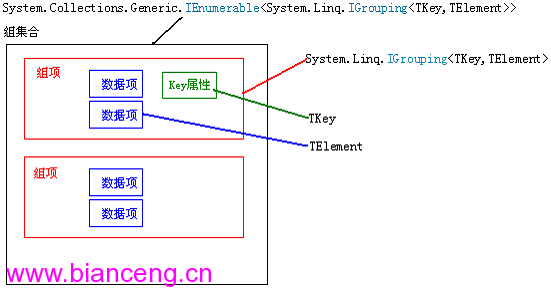
myContext context = new myContext();
var query = context.DBItemList.GroupBy(p => p.ItemID);
foreach (var g in query)
{
Console.WriteLine(g.Key);
foreach (var r in g)
{
Console.WriteLine("{0},{1},{2},{3}", r.AutoId, r.ItemID, r.NameID, r.ItemValue);
}
}
/*
a
23,a,n01,4
24,a,n01,5
25,a,n02,2
26,a,n02,3
27,a,n02,6
28,a,n03,3
b
11,b,n03,5
14,b,n01,2
16,b,n01,1
c
5,c,n01,4
7,c,n01,5
9,c,n02,2
10,c,n02,3
12,c,n02,6
17,c,n03,3
*/
SELECT
[Project2].[ItemID] AS [ItemID],
[Project2].[C1] AS [C1],
[Project2].[C2] AS [C2],
[Project2].[AutoId] AS [AutoId],
[Project2].[NameID] AS [NameID],
[Project2].[ItemID1] AS [ItemID1],
[Project2].[ItemValue] AS [ItemValue]
FROM ( SELECT
[Distinct1].[ItemID] AS [ItemID],
1 AS [C1],
[Extent2].[AutoId] AS [AutoId],
[Extent2].[NameID] AS [NameID],
[Extent2].[ItemID] AS [ItemID1],
[Extent2].[ItemValue] AS [ItemValue],
CASE WHEN ([Extent2].[AutoId] IS NULL) THEN CAST(NULL AS int) ELSE 1 END AS [C2]
FROM (SELECT DISTINCT
[Extent1].[ItemID] AS [ItemID]
FROM [dbo].[DBItemList] AS [Extent1] ) AS [Distinct1]
LEFT OUTER JOIN [dbo].[DBItemList] AS [Extent2] ON ([Extent2].[ItemID] = [Distinct1].[ItemID]) OR (([Extent2].[ItemID] IS NULL) AND ([Distinct1].[ItemID] IS NULL))
) AS [Project2]
ORDER BY [Project2].[ItemID] ASC, [Project2].[C2] ASC
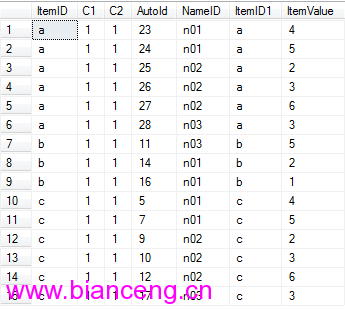
Join
聯合查詢
myContext context1 = new myContext();
ObjectQuery<DBItem> query1 = context1.DBItem;
ObjectQuery<DBItemList> query2 = context1.DBItemList;
var v = query1.Join(query2, temp1 => temp1.ItemID, temp2 => temp2.ItemID, (temp1, temp2) => new { temp1.ItemID, temp1.ItemMatter, temp2.ItemValue, temp2.AutoId, temp2.NameID });
foreach (var r in v)
{
Console.WriteLine("{0},{1},{2},{3},{4}", r.AutoId, r.ItemID, r.NameID, r.ItemValue,r.ItemMatter);
}
myContext context1 = new myContext();
ObjectQuery<DBItem> query1 = context1.DBItem;
ObjectQuery<DBItemList> query2 = context1.DBItemList;
var v = from temp1 in query1 join temp2 in query2 on temp1.ItemID equals temp2.ItemID
select new { temp1.ItemID, temp1.ItemMatter, temp2.ItemValue, temp2.AutoId,temp2.NameID };
foreach (var r in v)
{
Console.WriteLine("{0},{1},{2},{3},{4}", r.AutoId, r.ItemID, r.NameID, r.ItemValue,r.ItemMatter);
}
/*
5,c,n01,4,this is c
7,c,n01,5,this is c
9,c,n02,2,this is c
10,c,n02,3,this is c
11,b,n03,5,this is b
12,c,n02,6,this is c
14,b,n01,2,this is b
16,b,n01,1,this is b
17,c,n03,3,this is c
23,a,n01,4,this is a
24,a,n01,5,this is a
25,a,n02,2,this is a
26,a,n02,3,this is a
27,a,n02,6,this is a
28,a,n03,3,this is a
*/
SELECT
1 AS [C1],
[Extent1].[ItemID] AS [ItemID],
[Extent1].[ItemMatter] AS [ItemMatter],
[Extent2].[ItemValue] AS [ItemValue],
[Extent2].[AutoId] AS [AutoId],
[Extent2].[NameID] AS [NameID]
FROM [dbo].[DBItem] AS [Extent1]
INNER JOIN [dbo].[DBItemList] AS [Extent2] ON ([Extent1].[ItemID] = [Extent2].[ItemID]) OR (([Extent1].[ItemID] IS NULL) AND ([Extent2].[ItemID] IS NULL))
GroupJoin
myContext context1 = new myContext();
ObjectQuery<DBItem> query1 = context1.DBItem;
ObjectQuery<DBItemList> query2 = context1.DBItemList;
var v = query1.GroupJoin(query2, temp1 => temp1.ItemID, temp2 => temp2.ItemID, (temp1, temp2) => new { temp1.ItemID, temp1.ItemMatter, 個數 = temp2.Count() });
foreach (var r in v)
{
Console.WriteLine("{0},{1},{2}", r.ItemID, r.ItemMatter,r.個數);
}
myContext context1 = new myContext();
ObjectQuery<DBItem> query1 = context1.DBItem;
ObjectQuery<DBItemList> query2 = context1.DBItemList;
var v = from temp1 in query1
join temp2 in query2 on temp1.ItemID equals temp2.ItemID
into newtab
select new { temp1.ItemID, temp1.ItemMatter, 個數 = newtab.Count() };
foreach (var r in v)
{
Console.WriteLine("{0},{1},{2}", r.ItemID, r.ItemMatter,r.個數);
}
/*
a,this is a,6
b,this is b,3
c,this is c,6
*/
SELECT
1 AS [C1],
[Project1].[ItemID] AS [ItemID],
[Project1].[ItemMatter] AS [ItemMatter],
[Project1].[C1] AS [C2]
FROM ( SELECT
[Extent1].[ItemID] AS [ItemID],
[Extent1].[ItemMatter] AS [ItemMatter],
(SELECT
COUNT(cast(1 as bit)) AS [A1]
FROM [dbo].[DBItemList] AS [Extent2]
WHERE ([Extent1].[ItemID] = [Extent2].[ItemID]) OR (([Extent1].[ItemID] IS NULL) AND ([Extent2].[ItemID] IS NULL))) AS [C1]
FROM [dbo].[DBItem] AS [Extent1]
) AS [Project1]
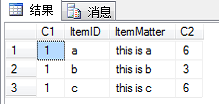
無效的Linq方法
可將ObjectQuery<T>轉換為List<T>後使用 List的對應方法
Aggregate
據輸入的表達式獲取一個聚合值
myContext context = new myContext();
List<DBItemList> list = context.DBItemList.ToList();
DBItemList r = list.Aggregate((x, y) => new DBItemList() { ItemValue = x.ItemValue + y.ItemValue });
Console.WriteLine("ItemValue合計為:{0}", r.ItemValue);
//print: ItemValue合計為:54
TakeWhile
條件第一次不成立就跳出循環
myContext context = new myContext();
List<DBItemList> list = context.DBItemList.ToList();
IEnumerable<DBItemList> v = list.TakeWhile(p => p.ItemValue >= 2);
foreach (var r in v)
{
Console.WriteLine(r.ItemValue);
}
//print
/*
4
5
2
3
5
6
2
*/
SkipWhile
條件第一次不成立就失效,將後面的數據全取
myContext context = new myContext();
List<DBItemList> list = context.DBItemList.ToList();
IEnumerable<DBItemList> v = list.SkipWhile(p => p.ItemValue >= 2);
foreach (var r in v)
{
Console.WriteLine(r.ItemValue);
}
//print
/*
1
3
4
5
2
3
6
3
*/
Reverse
順序返轉
myContext context = new myContext();
IEnumerable<DBItemList> list = context.DBItemList.AsEnumerable();
IEnumerable<DBItemList> v = list.Reverse();
Last,LastOrDefault
集合的最後一個元素,集合中沒有會報錯,
集合中的最後一個元素,沒有則返回類型默認值,對象型默認值為null
myContext context = new myContext();
List<DBItemList> list = context.DBItemList.ToList();
DBItemList l1 = list.Last();
DBItemList li = list.Last(p=>p.ItemValue==5);
DBItemList lid = list.LastOrDefault(p => p.ItemValue == 15);
if (lid != null)
{
Console.WriteLine(lid.ItemValue);
}
Single,SingleOrDefault
集合中符合條件的唯一元素,集合中沒有會報錯,集合中有兩個以上會報錯
集合中符合條件的唯一元素,集合中有兩個以上會報錯,集合中沒有則返回類型默認值,對象型默認值為null
myContext context = new myContext();
List<DBItemList> list = context.DBItemList.ToList();
DBItemList di = list.Single(p=>p.ItemValue==5);
DBItemList did = list.SingleOrDefault(p => p.ItemValue == 15);
if (did != null)
{
Console.WriteLine(did.ItemValue);
}
Contains
判斷集合中是否包含有某一元素
myContext context = new myContext();
List<DBItemList> list = context.DBItemList.ToList();
DBItemList r = new DBItemList();
r.ItemValue = 3;
bool b = list.Contains(r,new c());
class c : IEqualityComparer<DBItemList>
{
public bool Equals(DBItemList x, DBItemList y)
{
if (x.ItemValue == y.ItemValue)
{
return true;
}
else
{
return false;
}
}
public int GetHashCode(DBItemList obj)
{
return 0;
}
}
Distinct
過濾集合中的相同項
myContext context = new myContext();
List<DBItemList> list = context.DBItemList.ToList();
IEnumerable<DBItemList> v = list.Distinct(new c());
class c : IEqualityComparer<DBItemList>
{
public bool Equals(DBItemList x, DBItemList y)
{
if (x.ItemValue == y.ItemValue)
{
return true;
}
else
{
return false;
}
}
public int GetHashCode(DBItemList obj)
{
return 0;
}
}
ElementAt,ElementAtOrDefault
集合中指定索引的元素
集合中指定索引的元素,沒有則返回類型默認值,對象型默認值為null
myContext context = new myContext();
List<DBItemList> list = context.DBItemList.ToList();
DBItemList r = list.ElementAt(5);
DBItemList rd = list.ElementAtOrDefault(50);
DefaultIfEmpty
如果集合是的無素為空(count==0),就向集合中插入一個默認元素
DBItemList r=new DBItemList();
r.ItemValue=100;
List<DBItemList> list = new List<DBItemList>();
var pp = list.DefaultIfEmpty(r);
SelectMany
myContext context = new myContext();
List<DBItemList> query = context.DBItemList.ToList();
IEnumerable<string> ls=query.SelectMany(p => p.NameID.Split('0'));
foreach (string r in ls)
{
Console.WriteLine(r);
}
/*
n
1
n
1
n
2
n
2
n
3
n
2
n
1
n
1
n
3
n
1
n
1
n
2
n
2
n
2
n
3
*/
Lambda表達式
List<string> ls = new List<string>() { "wxd/1", "lzm/2", "wxwinter/3" };
var li = ls.SelectMany(p => p.Split('/'));
foreach (var s in li)
{
Console.WriteLine(s);
}  對應Select效果
var ll = ls.Select(p => p.Split('/'));
對應Select效果
var ll = ls.Select(p => p.Split('/'));
foreach (var s in ll)
{
foreach (var ss in s)
{
Console.WriteLine(ss);
}
}
SequenceEqual
myContext context = new myContext();
List<DBItemList> list1 = context.DBItemList.Where(p => p.ItemID == "a" ).ToList();
List<DBItemList> list2 = context.DBItemList.Where(p => p.ItemID == "a").ToList();
bool b = list1.SequenceEqual(list2);
Console.WriteLine(b);
//print:True